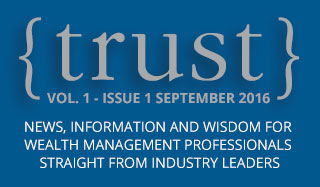Three reasons to love South Dakota
By Mary A. Akkerman
 Today more than ever, wealthy families rely on their advisors to help them traverse the complex world of estate and trust administration. South Dakota’s advantageous trust legislation makes the state a worthwhile option to protect clients’ assets.
Today more than ever, wealthy families rely on their advisors to help them traverse the complex world of estate and trust administration. South Dakota’s advantageous trust legislation makes the state a worthwhile option to protect clients’ assets.
Here are three important benefits of South Dakota’s trust and business law:
1. Privacy
Creating a new trust in or moving an existing trust to South Dakota can generally be done without the need to involve the courts. But sometimes, families and their advisors prefer to seek court approval for certain issues. Ordinarily, court proceedings are open to the public, and all court records resulting from these proceedings are made public as well. But not in South Dakota.
South Dakota law on privacy is unique. No other jurisdiction allows families to create, modify or terminate a trust in quite the same way. In South Dakota, families can use the trust-friendly court system, if needed, without exposing any trust information, financial details or court file records to the public or to disinterested third parties. For example, if a trust needs any changes to be approved through a court system, any interested party can ask that court files be sealed for privacy from inception, and the request to seal is automatically granted.
That means that sensitive family information, financial data and trust documents will not be exposed to third parties, the media or anyone who is not an interested party with respect to the trust. No other state has quite the same protections. Once sealed, the files remain permanently private, and no court records can be accessed or exposed to any other parties.
2. Virtual representation
But who exactly is an “interested party” entitled to trust information in South Dakota? In other jurisdictions, any potential beneficiary might be entitled to information or required to consent to certain actions with respect to the trust. However, court actions or non-judicial proceedings relating to trusts with contingent, minor, unborn or unascertainable beneficiaries are greatly facilitated in South Dakota due to virtual representation statutes, which allow any person with the same or similar interests to bind all beneficiaries.
This structure greatly decreases the amount of information given to beneficiaries, and it avoids the need for a Guardian ad Litem to be appointed to represent minor, unborn or unascertained beneficiaries. Other jurisdictions often require a Guardian ad Litem, which reduces privacy, adds complexity, slows things down and runs up costs.
3. Quiet trusts
But what if a family wants to set up a trust without notifying beneficiaries? Trustees in South Dakota have no duty to notify beneficiaries about the existence of an irrevocable trust until age 21, and South Dakota trusts can be structured to provide that beneficiaries need not be notified at all. The creator can also include provisions delaying notification until and unless directed to do so by the creator or trust advisors.
These quiet trusts work well for families that may not want beneficiaries to know the nature and extent of the family’s wealth. The creator of a trust in South Dakota can determine from the beginning whether other family members have any right to information about the trust, including its very existence. No other jurisdiction has such flexible rules on privacy.
Mary A. Akkerman is a partner at Lindquist & Vennum, a Minneapolis-based law firm providing a full array of corporate finance, transactional and litigation services for clients from offices in Minnesota, Colorado and South Dakota.



